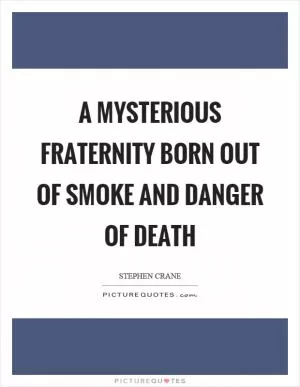Every sin is the result of collaboration

Every sin is the result of collaboration
In the works of Stephen Crane, particularly in his novel "The Red Badge of Courage," the theme of collaboration in sin is a prevalent and complex one. Crane's exploration of human nature and the moral dilemmas faced by his characters often revolve around the idea that every sin is the result of collaboration, whether it be with others or with oneself.One of the central themes in "The Red Badge of Courage" is the internal struggle of the protagonist, Henry Fleming, as he grapples with his fear and cowardice in the face of battle. Henry's sin, in this case, is his desertion of his fellow soldiers during a crucial moment in battle. While Henry's actions are ultimately his own, Crane suggests that his sin is the result of collaboration with his own inner demons and fears. Henry's fear of death and failure leads him to abandon his comrades, betraying their trust and putting them in danger. In this way, Crane illustrates how collaboration in sin can be a deeply personal and internal struggle.
However, Crane also explores the idea of collaboration in sin on a broader scale, highlighting how societal influences and external pressures can contribute to moral transgressions. In "The Open Boat," Crane depicts a group of men stranded at sea, struggling to survive against the forces of nature. As they face the harsh realities of their situation, the men are forced to make difficult decisions in order to survive. In this context, Crane suggests that collaboration in sin can also be a collective effort, as individuals are influenced and shaped by the actions and choices of those around them.
Overall, Stephen Crane's exploration of collaboration in sin is a nuanced and thought-provoking one. Through his vivid and realistic portrayals of human nature and moral dilemmas, Crane challenges readers to consider the complex ways in which individuals are shaped and influenced by their own inner struggles and external circumstances. Ultimately, Crane's work serves as a powerful reminder of the interconnectedness of human experience and the ways in which collaboration in sin can manifest in both personal and collective contexts.












 Friendship Quotes
Friendship Quotes Love Quotes
Love Quotes Life Quotes
Life Quotes Funny Quotes
Funny Quotes Motivational Quotes
Motivational Quotes Inspirational Quotes
Inspirational Quotes